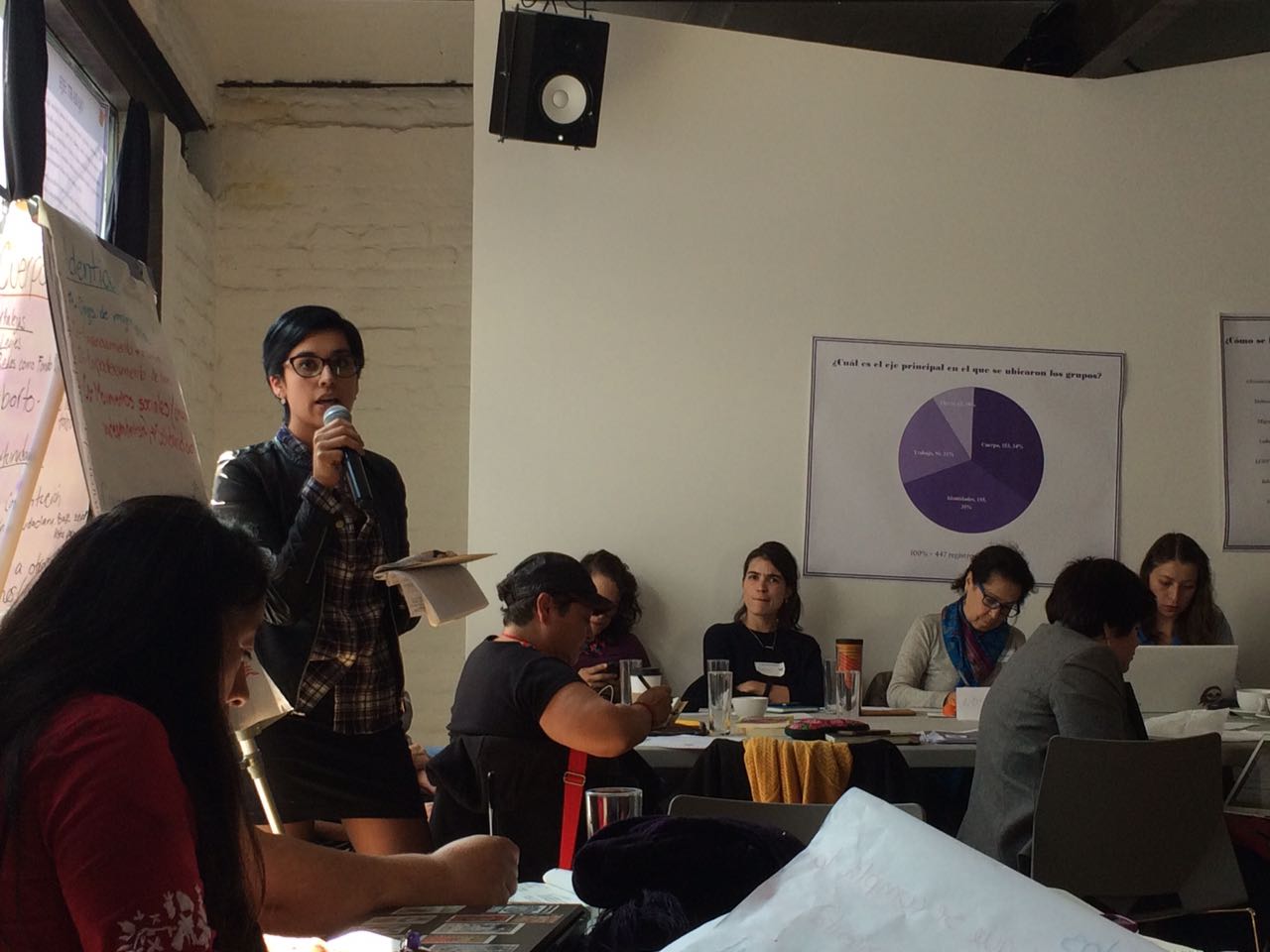Amidst the resurgence of authoritarianism and rising conservatism in many countries around the world, an increasing number of human rights funders are doubling their efforts to support resilient social movements.
Because these movements are sparked and fueled by those who are most affected by conditions of inequality, and because grassroots activists have a firsthand understanding of local contexts, their priorities and strategies cannot be defined by funders or other external actors.

In an advisers forum organized by Fondo Semillas, 40 activists discussed the state of feminist organizing in Mexico. Photo credit: Fondo Semillas.
Therefore, one of the most strategic actions that progressive funders can take is to turn over their decision-making power to social movements and trust in the expertise of the activists doing the work on the ground. But how?
Over the past two years, Fondo Semillas, a national women’s fund based in Mexico City, has worked to answer this question.
Many funders that carry out participatory grantmaking processes have written about the value of involving activists in grantmaking decisions regarding the movements in which they participate.
The experiences of funders who have engaged in participatory grantmaking since their inception such as the Red Umbrella Fund and FRIDA—the Young Feminist Fund have been particularly influential and inspiring to Fondo Semillas. However, we were unsure about how to make this transition 25 years after our organization was founded. We learned quite a few valuable lessons by giving it a try.
Recovering the values of feminist philanthropy
Fondo Semillas’ participatory grantmaking journey started within the framework of a strategic planning, during a process to build consensus around our institutional values and principles as a grantmaker.
To do so, we divided into working groups that included staff and board members, current and former grantees, and other key allies from the Mexican feminist movement. These groups highlighted values that are central to the fund’s feminist identity, such as shared power, inclusion, horizontality, and diversity.
Through these conversations, we reflected on the extent to which our own practice of resourcing women’s rights mirrored these ideals. We agreed that it was imperative to pay closer attention to the politics of how our grantmaking was carried out—who is included and excluded, what style of leadership is recognized, as well as how decisions are made and agendas set.
In our 27 years of funding women’s rights activism, we have learned that it is not our role to be prescriptive in our grantmaking by pushing for specific policy changes.
Rather, our experience is that these changes are the result of a strong feminist movement, which also plays a critical role in resisting setbacks and preserving previously-won victories for women’s rights.
We soon realized that it was somewhat hypocritical to assert that grassroots women are the experts on the issues facing their communities, while not fully involving them in decisions regarding how to allocate funding to grassroots women’s groups.
Previously, Fondo Semillas made grantmaking decisions with the support of small selection committees made up of staff and board members, as well as a few experts who were sometimes—but not always—former grantees. We decided that, in order to truly reflect our values, grassroots feminist activists had to play a much more central role in the decision-making process.
Defining participation
The term ‘participation’ gets thrown around a lot without much clarity. Many different models of participatory grantmaking exist, some of which include representatives of certain movements or communities in grantmaking decisions, while others involve the applicants themselves.
With the support of current and former grantees and other feminist allies, Fondo Semillas reviewed existing models and ultimately decided to include two main forms of participation in its new selection process. First, Fondo Semillas hosted a forum with 40 diverse representatives of the Mexican feminist movement.
Fondo Semillas selected the representatives based on their availability, knowledge of specific regional contexts, and areas of thematic expertise. After reviewing the organizational profiles of potential grantees, the forum participants engaged in small-group discussions regarding the status of feminist organizing in Mexico, first by region and then by thematic area.
Because over 400 women’s rights groups from throughout Mexico responded to our open call for proposals, it would have been logistically and financially impossible to include everyone in the forum.
However, the review process allowed us to identify 178 finalist organizations, who then voted among themselves through a peer review process.
Fondo Semillas divided the finalists into topic-specific groups of 10-20 organizations, who reviewed each other’s proposals (names of the organizations were removed for confidentiality). Each organization cast three votes and the finalists that received the most votes were awarded a grant.
Each form of participation added unique value to the selection process; the forum allowed for a more in-depth, strategic analysis of feminist organizing in Mexico, whereas the peer review process among finalists ensured transparency in the final decision-making stage.
In addition, our fear that the participatory process could cause tension among activists was unfounded; on the contrary, there was a lot of consistency among the voting results, which lent further legitimacy to the process.
Nevertheless, Fondo Semillas is still discussing how to improve peer voting processes when it comes to issues such as sex work, around which the Mexican feminist movement remains divided.
Recognizing the value of collective learning (and accepting imperfection)
One of the most important lessons we learned through this process was that if the reasons why we wanted to involve feminist activists in our grantmaking decisions were clear, how we did so could be refined over time.
In other words, if our participatory grantmaking process did not work perfectly during the pilot, our response would not be to scrap the idea altogether and go back to convening small selection committees.
Fondo Semillas’ way of doing participatory grantmaking is therefore best understood as an evolving model and an iterative process that will improve with each funding cycle. Our experience is that grappling with the politics of the process and learning collectively is incredibly valuable in and of itself.
When we designed our participatory grantmaking model, we wanted to facilitate a process that was useful to the Mexican feminist movement and that contributed to shared learning and movement building.
The participants confirmed that this process achieved that goal by providing a much-needed space for activists to come together and analyze the status of their organizing—what is working, what needs to be improved, and how best to move forward—while also allowing activists to learn about the strategies of other groups and identify opportunities for collaboration.
When Fondo Semillas began to re-think its grantmaking process, we felt ready to imagine bold new ways of relating to money and power, but in practice we were nervous about the unknowns that might accompany a surrender of control.
However, we were comforted by the belief that movements can challenge power and transform reality in ways that individual organizations, experts, and funders cannot. With that in mind, we invited others in and we listened.
Jenny Barry is the Head of Development at Fondo Semillas.
This article originally appeared on the Open Global Rights website on 18 January 2018. The original article can be found here.



Comments (0)